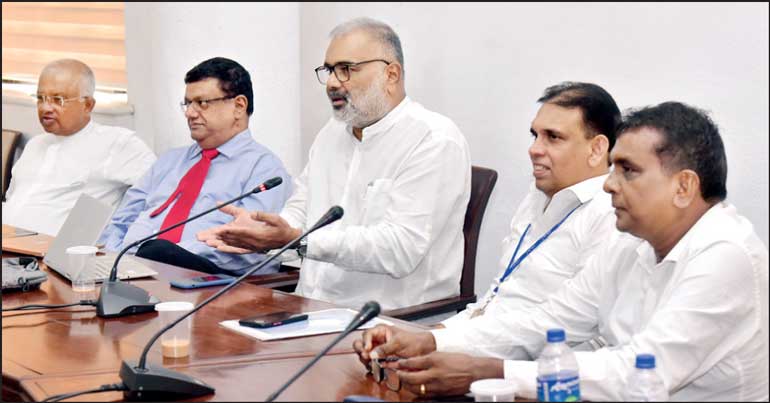Wednesday Feb 18, 2026
Wednesday Feb 18, 2026
Wednesday, 28 June 2023 00:22 - - {{hitsCtrl.values.hits}}

From left: SLAITO Committee Member Rohan Abeywickrema, Past President Mahen Kariyawasan, President Nishad Wijetunga, Vice President Nalin Jayasundera and Past President Devindre Senaratne – Pic by Ruwan Walpola
By Charumini de Silva
The Sri Lanka Association of Inbound Tour Operators (SLAITO) yesterday urged caution against the proposal put forth by hoteliers to reintroduce minimum room rates (MRR) from August, as it will lead to Sri Lanka being perceived as an expensive destination and negatively impact its competitiveness.
The claims come right after Tourism Minister Harin Fernando on Monday endorsed the decision to reintroduce the MRR for the sustainability of the hotel operations.
“Over the past four years, the tourism industry has faced significant challenges, but none of those were controllable. Unfortunately, this situation, which can be controlled, is being driven by industry stakeholders solely for their own satisfaction,” SLAITO President Nishad Wijetunga told journalists.
Inadvertently, the association said the move to reintroduce MRR sends a message discouraging visitors from choosing Sri Lanka as their next holiday and MICE (Meetings, Incentives, Conferences, and Exhibitions) destination.
“Sri Lanka is not operating in isolation, but faces competition from popular destinations such as Thailand ($ 80, BB inclusive all taxes), Vietnam ($ 105, BB inclusive all taxes), Delhi ($ 95, BB inclusive all taxes), and Malaysia ($ 80, BB inclusive all taxes),” he added.
SLAITO believes that hoteliers should take the initiative to self-regulate first, rather than relying on imposed regulations.
He also emphasised that the successful timing of marketing efforts during this time will be undermined if the Government proceeds with price regulations. “The period from July to September is crucial for attracting tourists from Europe and other long-haul markets. But if the Government wants to stipulate MRR, the marketing efforts that will start from the end of next month for two months will make no sense,” he added.
SLAITO asserts that hoteliers have misled decision-makers, giving the impression that Sri Lanka wants to position itself as an ‘upscale destination’. “The Hotels Association of Sri Lanka and the Colombo City Hoteliers Association have gone to the Sri Lanka Tourism Development Authority (SLTDA) Board with an ‘information paper’ and have gotten the approval,” they alleged.
They claimed that the hoteliers arrived at the decision without any consultation or consensus.
However, as of now, SLAITO has not made a formal representation to the SLTDA or the Minister regarding this matter. But they said an informal brief discussion was held on Monday and they intend to meet the Minister as soon as possible to clarify the situation and reverse the decision.
“Our stand is that the market forces should determine prices and not an MRR,” Wijetunga insisted.
When asked if the industry has no unity to ensure sustainable growth and success in the tourism sector, he said one isolated incident cannot decide it and thus they want to resolve it immediately as a ‘one industry’.
Noting that Sri Lanka is still not a popular MICE market, he said the move to stipulate MRR will make the destination very unattractive. “The MICE market has been performing well, with an increase in activity particularly from India following the roadshow. However, if prices are regulated and budgets for incentive groups are exceeded, they may choose alternative destinations like Malaysia or Thailand instead of Sri Lanka,” he explained.
Wijetunga said without demand, if authorities want to introduce price controls, it will be unsuccessful. “High-end tourism is good, but who is going to fill in the rooms at $ 152 (bed and breakfast, per night) with 29% tax or $ 290 (full board, per night) + 29% taxes?,” he asked.
SLAITO Vice President Nalin Jayasundera said implementing minimum room rates would force business tourists to stay, resulting in adverse consequences for hoteliers themselves and businesses dropping by 75%.
“Some hoteliers like this notion of having a reduced occupancy rate as long as they have the price coming in. But then what will happen to the suppliers, guides, transport companies and the economy at large?” he argued.
Jayasundera said making the tourists pay for the financial burden of hoteliers on top of expensive long-haul air ticket prices is unfair and will only make the destination uncompetitive,” he claimed.
SLAITO Past President Devindre Senaratne argued that the focus should be on establishing criteria for the number of rooms in Colombo, as there is already an excess.
They also said when MRR was imposed in 2009, they were effective for only two years, and afterwards, hotels undercut the rates.
